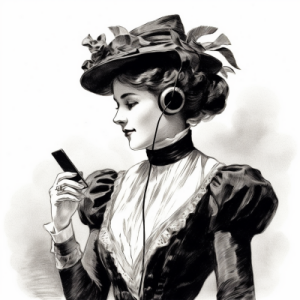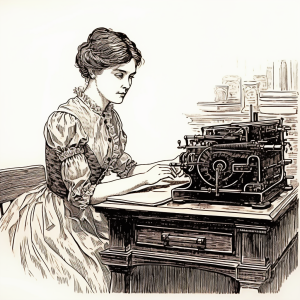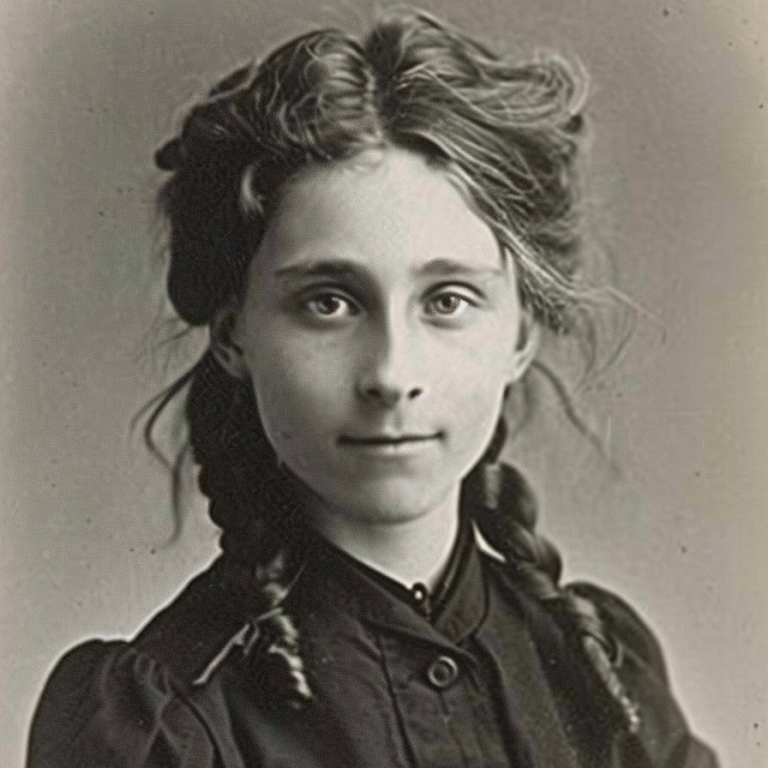CHAPTER VII.
MY LAST DAYS IN SERVICE.
DURING my stay at Mrs. Brownlow’s I discovered that domestic labour, arranged in a reasonable manner, was not in itself difficult work. Not having a taste for household duties, and having had no experience except that gained by practising some of the parlourmaid’s duties at home and a week’s observation and work at Mrs. Allison’s, I was not, of course, so well equipped as a well trained domestic servant would have been; but, in spite of these drawbacks, I did the work quickly and neatly, and Mrs. Brownlow informed me that none of her former servants had suited her so well. She began at once to plan how she might dispense with ordinary domestics, and replace them by young women who would take a genuine interest in their work and render her something more than eye service. Sarah was an excellent cook, and there was no fault to be found with the food as it was prepared for the table; but she was afflicted with a very common complaint among cooks, laziness, and was continually talking about the need of a kitchen-maid, although the whole basement was conveniently fitted up, and the cook’s duties were so light that her mistress did not feel disposed to hire an assistant for her. Mrs. Brownlow had consented, at the cook’s request, to have only one set of meals prepared, except as regarded the servants’ breakfast, the kitchen breakfast coming earlier, as a matter of course. At eleven they were allowed a light luncheon, and at half-past one, after the family had lunched, the servants ate the same food as was served at the dining-room table, and for the night dinner it was arranged that they could dine immediately after dessert was served. Although these changes in the usual routine of servants’ meals were made to please the cook and lighten her labours, she did not show any appreciation of the favour, and positively refused to scrub the doorstep, clean the knives, or black the boots/which she declared was not “her place,” while the housemaid insisted that she did not “bargain for that business.”
Mrs. Brownlow was a woman of gentle, even temper, who took for her motto, “Live peaceably with all men, if it be possible,” and so to preserve anything like the semblance of order in her household, she hired the brigade boy to attend to these things, and was constantly putting herself to trouble and expense for the sake of her servants. She had a decided talent for artistic work, and was interested in music, and, as she explained to me, she did not care to devote her whole attention to the management of her house. Her daughter, a young lady of about twenty, had but recently made her debut in society, and had literary aspirations, as she one day confided to me. She did not wish to turn housekeeper, and the French maid did not understand enough English to act as deputy for her mistress. If the servants had been of the sort who would perform their duties conscientiously, Mrs. Brownlow need have devoted only one hour each morning ta overlooking the housekeeping; but, as it was, they took advantage of her kind and easy way, and the two chief qualities displayed by the cook and housemaid were indolence and extravagance.
“Why do you not wipe the hot-water cans before you set them in the hall?” I said one morning to Alice, who had been distributing the water at the different bedroom doors.
“Because it’s too much trouble,” she answered, with a toss of her head.
“But you will ruin the carpet,” I insisted.
“Well, it’s not your carpet, so you will please mind your own business,” she retorted.
Now, what could be done with a girl so perfectly devoid of honour ? I asked her how she expected to keep a situation, and how she could get a character, if she did not try to please her mistress.
“Well, I’d make a time if she wouldn’t give me a character,” was her answer, as she went to the next floor dripping water over the stairs.
And she did “make a time;” for the very next day Mrs. Brownlow, losing all patience with her because she would not turn the mattresses or even take the quilts entirely off before making the beds, said, “Alice, I cannot put up with your careless habits any longer, and I wish you would look for a new situation. I give you notice to-day.”
Alice replied, “I’ll go to-day if you 11 give me a month’s wages and let me have a character.”
“It will be impossible for me to give you a character, unless it is a very bad one,” answered her mistress.
And then the “time” commenced. Alice threatened her with all the dreadful consequences imaginable • said she knew certain things she would tell all over’London, and accused Mrs. Brownlow of taking the bread out of her mouth. She did not become quiet until Mr. James Brownlow came in and gave her what he described as a “dressing down,” when she slunk away to the kitchen, whimpering about the cruelties of mistresses, and giving her opinion in no gentle terms of certain kinds of parlourmaids.
However, she did not leave that day, probably deciding that it would be better to remain her month out with the hope that she might, after all, obtain the'”character” to help her secure another situation. On Sunday she took her half-day off, going out immediately after breakfast, and I did the bedroom work that morning. Everything was much more convenient and comfortable than it had been at Mrs Allison’s. Two of the rooms being on the same floor with the bathroom, the filling of the water-pitchers was an easy matter, and I had only to go down one flight of stairs to carry water to Mrs. Brownlow’s room. With the assistance of Janette I was through all the work by eleven o’clock, and was able to rest until it was time to lay the table for the two o’clock dinner. In the afternoon I remained in my room, attending to some newspaper correspondence, and writing a long letter to the Editor of the Weekly Sun. I requested him to look up for me a superior young woman, thoroughly domesticated, who would be willing to take a situation as parlourmaid in Mrs. Brownlow’s house when I left the following Thursday, as he knew I must do. I gave a full description of the family, the house, and a list of the duties expected of the parlourmaid. Then I made arrangements to have a telegram sent me on Wednesday requesting my presence in the City that afternoon on important business, which would appear to give me a plausible excuse for resigning my situation.
That night I slept the sleep of the just, and awoke Monday morning feeling fortified against all the attacks of Alice, my enemy. We were engaged all day in preparing for Mrs. Brownlow’s reception, which was to be given in the evening. Two extra servants were hired to answer the door and assist in waiting on the guests, who began to arrive about half-past nine. At twelve o’clock I was serving punch and sweets in the drawing-room, and was getting on famously, when I heard someone exclaim under his breath, “Well, my eyes!” and, looking towards the speaker, I recognised an acquaintance, a well-known London publisher. In spite of my consternation, I was rather amused at the look of bewilderment on his face; for he knew nothing of the experiment I was making, and two weeks before I had entertained him in my own home. My cap and apron had not disguised me as much as I had hoped, and, knowing the proclivity of the male sex to gossip, I began to pull my wits together to plan a way to prevent a catastrophe and save myself from detection. When I went to the dining-room for further supplies, I hurriedly wrote on a slip of paper, “You don’t know me, understand,” and, returning to the drawing-room, I slipped the note into his hand as I passed him a plate of sandwiches. Then he was seized with sudden convulsions of laughter, which nearly made me lose my equilibrium, but I felt sure that he was a true friend and would not tell when he understood my position. Later I opened the door for him, and as he passed me he whispered, “What’s it for?” and I answered, “A book for you to publish,” whereupon he left the house and jumped into a hansom, humming “Oh, my Mary Ann.”
I seemed to be fated to have romantic adventures at Elsmore Lodge. Tuesday night I went to bed at the usual time, 10.30, and I thought I had only slept a few minutes when I was awakened by the ding-a-ling of the front-door bell. Lighting a match, I discovered that it was three o’clock. The house was perfectly quiet except for the bell, which seemed to be summoning me down-stairs unto dreadful things I knew not of. To say that I was afraid to go to the door only mildly expresses my feelings. My room was a back one, so I could not first look out of the window and inspect the bearing of the visitor. Finally I plucked up a small amount of courage, donned my dress and slippers, and with a night-lamp I started down-stairs, trying to shame myself into bravery. Was I not a journalist ? Ha I not bearded many a lion in his den, and should now tremble at being obliged to go to the door at three o’clock in the morning ? It was of no use; the further down-stairs I got, the more my knees knocked together from very fear, and I had to admit to myself that I was nothing but a very timid woman,, after all. Then I thought of a way by which I could view the ringer of the bell at a distance before opening the door, and I went into the library, noiselessly unbolted and drew up the window, and looked out. There on the step stood Mr. James Brownlow, ringing the bell with one hand and with the other vainly trying to insert the key in the lock. I took in the situation at once. He had been at the Savage Club. I quietly closed the window again and opened the door, uttering not a word and trying my best to look respectful and sedate. “Thank you. Don’t mention it to anybody,” he said, passing up-stairs, while I fastened and bolted the door. So there I was, with a secret on my soul, and not allowed to tell it to anybody! How I should have enjoyed repeating the story to one of his brother Savages; but that was impossible, so I had to content myself to keep it until I got out of service, knowing that then I could unburden myself to the public.
I became quite an expert in laying and waiting on the table, and I grew proud of my skill in making it look beautiful with bright china and silver. When I took off the table-cloth I was always careful to fold it in the same creases. I used a brush in cleaning out the crevices of the cut-glass tumblers and dishes. I made such an improvement in their appearance that they elicited the admiration of all the family, especially of Mr. James Brownlow, who took frequent occasion to compliment me on the improved condition of things in general, and even went so far as to say that he thought the most sensible employment for all poor girls was domestic service, for which work I seemed particularly fitted. I did not feel at liberty to argue the point with him at that time, nor did I attempt to disabuse his mind of his very pleasant impression. I only thought that if I, in the face of so many difficulties, was able to satisfactorily perform the duties of a parlourmaid, what could not a girl with inclination and training do?
Miss Mary Brownlow took quite a fancy to me, and one day broached the subject of my being her personal attendant and companion—a sort of private secretary for her while she was engaged in writing various newspaper and magazine articles, which, so far as I could determine, were generally returned to her in the stamped envelope she enclosed. I told her it was impossible for me to hold such a position, that my handwriting was neither beautiful nor easily read. Then she suggested that I should learn typewriting and take dictation from her, while I was obliged to use all my self control to keep back a smile, wondering what her astonishment would be if she could see me a week later writing up my experiences at her home on my own beloved typewriting machine.
“Oh, I could never learn, I am sure, and I would not like to be a secretary. I’d rather be a parlourmaid,” I said.
In the kitchen everything went at sixes and sevens. Alice, although less impertinent in her treatment of her mistress, vented her spite on me, and tried to the best of her ability to drive me mad with her constant insinuations that I was to blame for her discharge, and threatened to pay me up for it some day. She said she had lost two of her handkerchiefs the day before, and vaguely hinted that I used some just like them, till, what with the loud talking, bickering, and general uproar, I feared my head would completely give way. As it was, I was seized with a violent headache, which Mrs. Brownlow observed, and sent me up-stairs to lie down, while Miss Mary Brownlow — dear heart!—tried to doctor me with the laying on of hands and brown paper saturated in vinegar. It was her own remedy, and she recommended it very highly. It really did me good, and at luncheon I was up and about again. A few hours later, when we were having our tea, the door-bell rang, and I jumped up to answer it.
“Go out in the area, and see who it is before you go up. Maybe it’s only a tramp,” said the cook.
“But perhaps it’s one of Mrs. Brownlow’s friends, and suppose she looked down into the area and saw me. Do you think that would appear nice?”
“Well, do as you like. I only tried to save you steps,” was her ungracious reply.
This going to the area to view a visitor from a distance is a very common practice among parlourmaids and menservants. I have often noticed it at houses where I have called. There cannot possibly be any excuse for it in a well-ordered house, yet I have seen it among servants of the very best people. I was discouraged with trying to instil right principles of action into Alice’s and Sarah’s minds. It was sowing seed on stony ground. The motto which they seemed to think was the proper one between kitchen and drawing-room was “War to the knife.” The morning after the entertainment Alice chipped off a piece of a very handsome and expensive cut-glass dish, and said nothing to Mrs. Brownlow about it, although I begged her to do so. It placed me in rather an awkward position, for I did not wish to gain the reputation of being a tale bearer, nor did I think it right for Mrs. Brownlow to remain in ignorance of the affair. In the afternoon she came down to the pantry to show me about rearranging the glass and china cupboards, and noticed the broken dish at once. She knew that she had sent Alice down-stairs with it, and, of course, concluded she had broken it; but when Alice was questioned she stoutly denied it, saying it was whole when she put it in the cupboard. But her mistress had occasion to remember other incidents, and, although she refrained from openly accusing Alice, I could see that she knew who was the culprit.
The cook was a very intelligent sort of person, well versed in her profession, and, had she cared to do so, she might have made a valuable servant. When she felt so inclined, she was able to manufacture the most delicious little side-dishes from small bits of meat, fish, or other things left over, though she oftener chose to present such things to her sister, who was almost a daily visitor in the kitchen. Sarah gave me occasional hints in regard to certain household work. She showed me how to clean the water carafes by the use of shot, how to restore gilt frames by rubbing them with turpentine, and she also informed me that I could keep the silver bright for a long time by placing a lump of camphor in the silver chest. I noticed that she always kept an oyster shell in the tea-kettle, which, she explained, collected all the sediment that usually gathers in such kettles and often makes the water look muddy. If she had only done as well as she knew, she would have indeed proved to be “a treasure.”
Wednesday, a telegram addressed to “Elizabeth Barrows “came to Elsmore Lodge. It was from my solicitor, and read, “Come to my office at once. Important news concerning your father’s relatives. Must go to Liverpool.” Thinking to prepare Mrs. Brownlow for my resignation, I showed her the message.
“Perhaps it is good news for you. How nice that would be! though I would not like to have you leave me,” she said, and then told me I might go to the City at once.
I went to the office of the Weekly Sun. There I met a sensible young woman, named Lucy Atkins, the daughter of a physician with whom one of the members of the staff had been acquainted. She was refined and quiet, but tall and strong in appearance, and she assured me that she was particularly well versed in all matters connected with domestic work. I promised to use my influence to get the situation for her. I returned to Mrs. Brownlow, and told her I had received news which necessitated my presence in Liverpool, and that I was likely to come into the possession of a small yearly income, which would do away with the necessity of my remaining in service. Had it been possible, I should have preferred to tell the whole truth to Mrs. Brownlow; but I knew that could not be done for the present, and I was obliged to invent an excuse for leaving her. Then I told her that, appreciating her kind treatment, and knowing what a comfortable situation a girl might find with her, I had endeavoured to get her another servant in my place—not a servant of the ordinary kind, but a woman of intelligence, thoroughly domesticated, and able to perform the duties much better than I had done. Mrs. Brownlow was kindness itself, and the whole matter was quickly arranged. I telegraphed for Lucy Atkins to call, and she came that evening for an interview. The next morning she brought her box and entered upon the situation, and I spent the day in showing her what I knew of the work. It happened that she had two friends, a widow and her daughter, who wished a place together, the mother as cook housekeeper and the daughter as housemaid or parlourmaid, and Mrs. Brownlow wrote, asking them to call on her with the object of taking them into her service if she was suited. When I was ready to leave, Mrs. Brownlow offered me my week’s wages, which I refused to take, asking her to give the money to some other girl who would need it more than I. When I said good-bye, she told me to call on her as soon as possible and tell her all about myself and how I was getting on. I said that I would do so, and I fully intended to keep my promise, and explain the whole matter to her in the near future.




